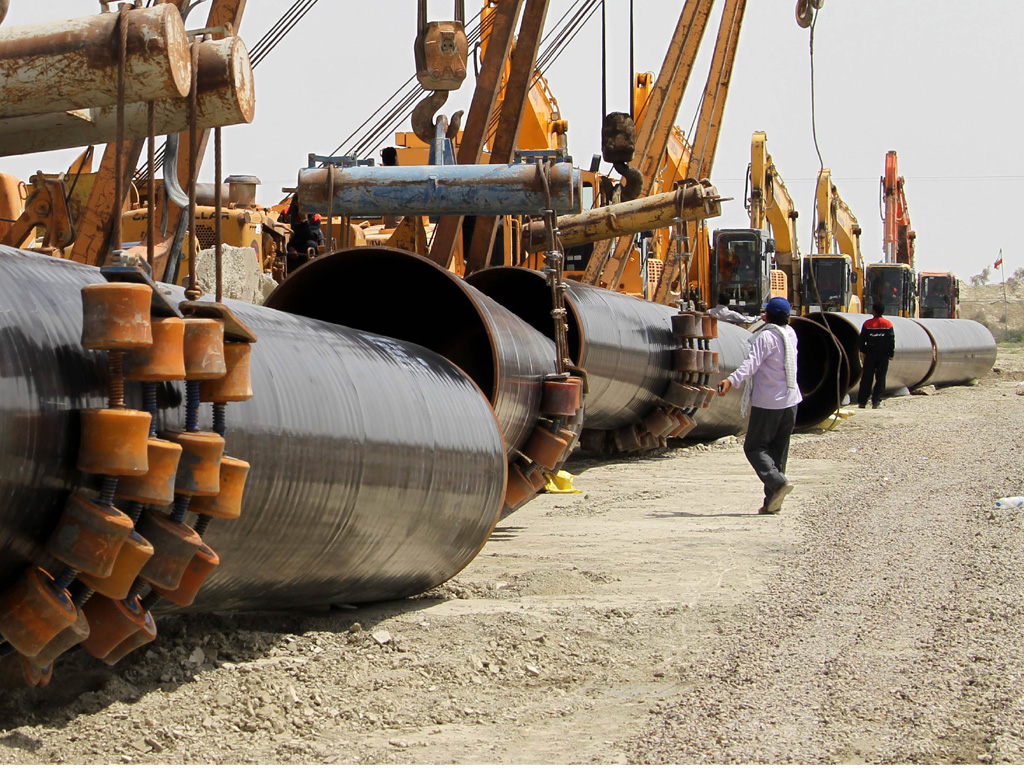Saudi Arabia is expected to help fund Turkmenistan’s construction of a major international gas pipeline that will connect its supplies as far away as India, through the Turkmenistan-Afghanistan-Pakistan-India transnational gas pipeline (TAPI).
“Saudi Arabia expressed interest in the implementation of joint projects in the fuel and energy sector and a number of other industries,” the Vice Chairman of the Cabinet of Ministers of Turkmenistan, Myratgeldi Meredov, said on October 19, according to the Russian website Investing.com.
Meredov said that Saudi Arabia’s decision to invest in TAPI was announced by the Kingdom’s Minister of Trade and Investment, Majid bin Abdullah al Kasabi, during the sixth meeting of the intergovernmental Turkmen-Saudi Commission on trade and economic cooperation held in Ashgabat from October 16-18.
“The investments allocated by the Saudi Fund for Development, indicate an interest in the construction of the TAPI pipeline of foreign investors, highly assessing the relevance and potential of this project, its profitability and return on investment,” Turkmenistan’s President Gurbanguly Berdimuhamedov was reported to have said at the meeting last month, according to Neftegaz.ru.
The TAPI pipeline, also known as “the peace pipeline,” runs 1,814 km from Galkynysh, the largest gas field in Turkmenistan, through the Afghan cities of Herat and Kandahar. The line ends at Fazilka, located near the India-Pakistan border. Construction in Turkmenistan began nearly three years ago in the city of Mary, near the Galkynysh gas field. The pipeline is expected to open in 2020, transporting 33 billion cubic meters (bcm) of natural gas per year.
The Saudi Development Fund began allocating funds for the purchase of pipes to be used in the pipeline’s construction as early as November 2017. Additionally, the Saudi-based Islamic Development Bank approved a loan worth $700 million for Turkmenistan to its portion of TAPI.
Also last November, Turkmenistan’s national gas company Turkmengaz, the largest of its kind in Central Asia, signed a contract with the Saudi-German joint venture Global Pipe Company for the supply of pipe products worth $40 million.
Turkmenistan and Saudi Arabia have some of the world’s largest fossil fuel reserves. Saudi Arabia has the world’s fifth largest gas reserves, while Turkmenistan is next in line, with 7,504 bcm of proven reserves.
Cooperation between Ashgabat and Riyadh goes beyond the energy sector, however.
Turkmenistan recently stepped up its procurement of defense hardware from the Gulf states, including the Al Shibl model armored vehicles from Saudi Arabia, which were revealed last month. The total number of units purchased from Saudi Arabia is unknown.
Considering the Saudi-Iranian rivalry it is unsurprising that Turkmenistan’s president has been attempting to charm Riyadh. Turkmenistan’s relations with its Caspian neighbor Iran are not on a good footing.
In an interview with Tasnim News Agency on October 17, Iran’s Deputy Oil Minister Hamid Reza Araqi, who also heads the National Iranian Gas Company, said that Turkmenistan had filed an arbitration dispute with Iran over gas swaps, which was first reported in August, but that Iran had filed a countersuit.
In August, Iran inaugurated the Damghan-Neka gas pipeline that officials say will allow Iran to end its gas deals with Turkmenistan, which had been providing fuel to Iran’s northern provinces, especially in the winter when demand significantly increases.







 President Aliyev emphasized the critical role of the North-South Transport Corridor in fostering transport cooperation between Azerbaijan and Russi...
President Aliyev emphasized the critical role of the North-South Transport Corridor in fostering transport cooperation between Azerbaijan and Russi...
 Armenian sappers commenced on Monday mine-clearance operations in the territories adjacent to the Saint Mary Church in village of Voskepar (Armenia...
Armenian sappers commenced on Monday mine-clearance operations in the territories adjacent to the Saint Mary Church in village of Voskepar (Armenia...
 The Mine Action Agency of Azerbaijan (ANAMA) reported on Thursday the discovery of a significant amount of explosives in the Khojavand district of ...
The Mine Action Agency of Azerbaijan (ANAMA) reported on Thursday the discovery of a significant amount of explosives in the Khojavand district of ...
 Russian Foreign Minister Sergei Lavrov has reasserted that Moscow has no intentions to stop the fighting in Ukraine, even if peace talks commence.
Russian Foreign Minister Sergei Lavrov has reasserted that Moscow has no intentions to stop the fighting in Ukraine, even if peace talks commence.



